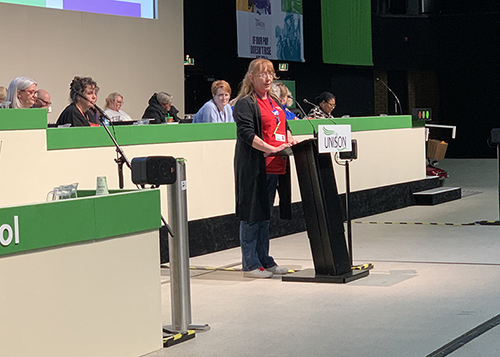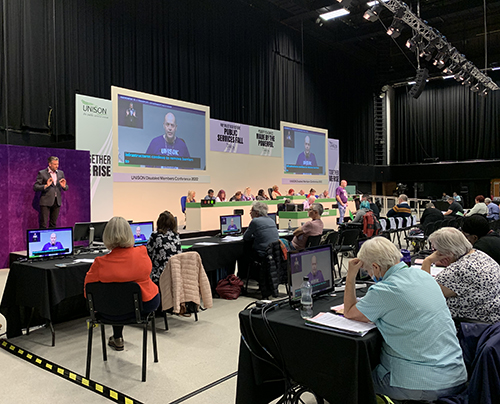Delegates to UNISON’s health conference debated a series of motions under the collective heading of health, safety and wellbeing, on Monday and Tuesday afternoons.
“Let’s commit to fostering a workplace where every woman feels valued,” said Susan Parkinson (pictured above).
Moving a motion on women’s mental health at work for the national women’s committee, she explained that women experience higher levels of mental health problems than men.
Karen Buckley from Greater Manchester stated that 76% of the NHS staff are women. Alongside the fact that the majority of carers – paid and unpaid – are also women, and that low pay, the cost of living crisis and discrimination particularly affect women, it is little surprise that, as inequality has worsened, so mental health issues for women have increased.
“Most of all,” continued Ms Buckley, “we need social justice.”
Angie from the Homerton Hospital branch raised the issue of how being a Black women can intensify mental health problems, while a delegate from Northern Ireland, called out, to applause: “Stuff the stigma [around mental health]! Get the support from the people around you!”
Several delegates spoke movingly of their own experiences, as conference called on the service group executive to “work with the national women’s committee to campaign for mentally healthy workplaces where women can thrive”, and to “promote UNISON’s guide to bargaining on mental health to woman members working in the health sector, branch and regional women’s officers and self-organised groups”.
Brenda, moving a motion for the North West, pointed out that helping members deal with mental health issues “isn’t covered in the organising stewards’ course”. Delegates agreed that the executive should “encourage regions to provide training and guidance on signposting to help stewards support members who may be facing challenges with poor mental health.”
Delegates also backed motions calling for:
- improved mental health access within the NHS
- improved gender identity services and trans healthcare, as underfunding has turned the issue into a health and safety issue for NHS members
- Long COVID to be recognised as a disability
- the service group to encourage NHS organisations and outsourced providers of NHS services to sign up to the Sexual Safety Charter and support branches to work for full implementation of the charter.
A busy afternoon

On a busy Tuesday afternoon, delegates also discussed the issue of safe staffing within the health service – noting that this also has health and safety, and wellbeing considerations.
Moving the motion, Martin Mackay from Scotland said that, while the Health and Social Care (Staffing) (Scotland) Act 2019, which has just come in to force, is welcome, it still does not include “all staff in our One Team”.
Emma Dale (pictured above) from South Wales gave an example of how not all NHS staff are covered. “I worked in forensic mental health,” she explained, so wasn’t covered. After an incident with a violent patient, she had to move from a job she loved into an admin post.
The article Delegates support calls on wellbeing and health and safety first appeared on the UNISON National site.
